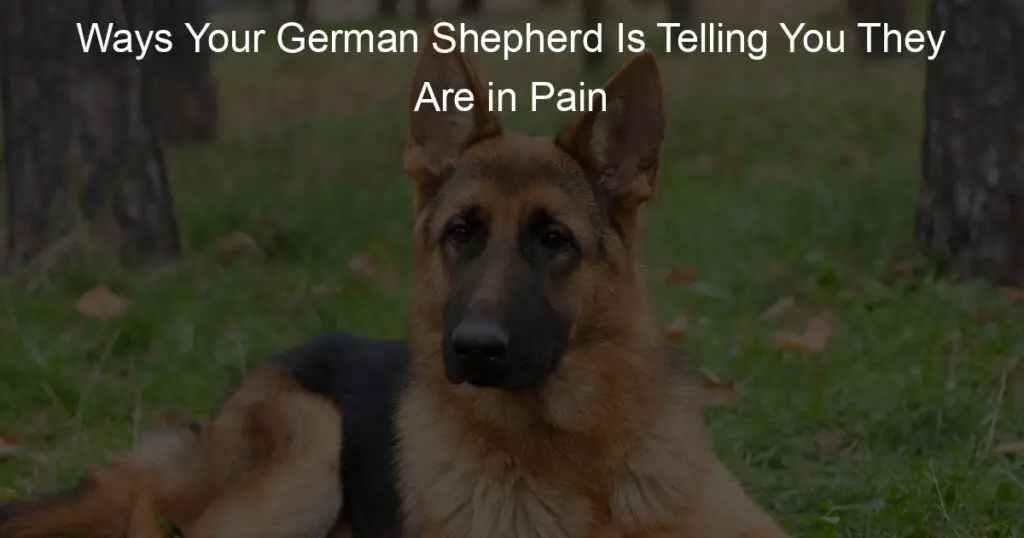It’s heartbreaking to learn that your beloved German Shepherd is suffering from pain. After all, you have created a special bond with them as your loyal best friend and protector for so many years. But did you know that there are subtle signs of pain they tend to display? Looking at their behavior can offer clues into how they are feeling in their body and has the potential to help catch discomfort sooner than if left unnoticed.
What are the common signs that my German Shepherd is in pain?
If your German Shepherd is in pain, some of the most common signs you can look for are a change in their behavior, obvious signs of discomfort, decreased activities, and overall lower energy. They may be more vocal than usual, which could indicate a response to pain or an inability to move due to stiffness.
You should also pay attention to limping or difficulty moving around as well as lagging on walks and general sluggishness. Look out for things like grinding teeth, yawning, panting heavily, and trembling.
All of which can mean that your beloved pup is struggling with something internally. If you aren’t sure what might be causing them distress, it’s always best to schedule a vet appointment so they can have a checkup and get any necessary treatment.
How can I tell if my German Shepherd is in pain?
Whenever you have a beloved family pet, especially one as big and powerful as a German Shepherd, it’s important to pay special attention to any potential physical discomfort they might be experiencing. There are a few telltale signs that your GSD is in pain.
If they seem to be unwilling or hesitant to engage in activities, appear restless or pace around, favor any particular part of their body, vocalize more often than usual or display decreased appetite. The best thing to do if you suspect your pup is feeling under the weather is to book an appointment with their veterinarian for an examination and proper diagnosis. Taking care of your four-legged friend from the start can ward off major medical problems before they arise!
What are the signs of joint pain in German Shepherds?
German Shepherds, like many large breed dogs, are prone to severe joint pain due to genetics and the structure of their bones. Fortunately, the signs are easily identifiable if you know what to look for.
Some common signs include limping or difficulty walking, whining or yelping when touched in certain areas, stiffness – especially in the mornings – and a reluctance to play or move normally. If your German Shepherd is exhibiting any of these signs, it’s important to visit a vet as soon as possible so that whatever underlying issue is causing this discomfort can be properly diagnosed and treated.
Taking proactive steps to support joint health is also important; things like nutrition-packed food, moderate exercise, and considering supplements such as glucosamine may help keep those joints healthy and protected against future pain.
Can changes in my German Shepherd’s behavior indicate pain?
Paying close attention to your German Shepherd’s behavior can provide insight into their well-being and help alert you to any physical pain they may be feeling. Pain can cause sudden changes in their usual behavior, such as inability to focus, aggression, and restlessness. It’s important to take these changes seriously and investigate the reason behind them if they persist.
If your Shep is in pain, it’s best to schedule a vet appointment so they can diagnose the problem and administer the necessary treatments. Painful periods can be tough for both you and your pup; understanding what might be causing it is the first step in providing your best friend with a happy and healthy life.
Do German shepherds hide their pain?
German shepherds are renowned for their intelligence, loyalty, and unflinching courage; so it can be surprising to hear that these wonderful dogs tend to hide pain.
Although they are famously stoic and have an inherent capacity for endurance, German shepherds — like all other breeds — do experience pain. They may try to mask any suffering though, as this isn’t part of their natural role in the pack hierarchy.
Pain avoidance tactics can prevent further injury by disabling or slowing down an animal if necessary; so with German shepherds, this behavior isn’t necessarily something to worry about. To ensure your four-legged friend is healthy and comfortable, however, regular vet visits should be a priority and you should always take note of any changes in behavior which could point to inner discomfort.
How do you comfort a German Shepherd in pain?
Comforting a German Shepherd in pain can be a challenge as they are an independent breed of dog with strong personalities. However, taking the time to offer your presence and provide some TLC could help to ease their suffering. It is important to create a soothing environment – offering treats, familiar toys or petting can help them feel secure.
Additionally, if possible, it may help to take your Shepherd for short walks and provide mental stimulation by playing calming games like hide and seek. Most importantly, ensure that their medical needs are taken care of by visiting the vet immediately if needed as this will give your pup peace of mind and restore their energetic demeanor once fully recovered.
Conclusion
Pain is something all living beings experience, so it’s important to understand how our beloved German Shepherds communicate their physical discomfort to us. Through their body language and behavior, your pup can help you identify when their health isn’t up to par. Now that you know the signs of distress in your four-legged friend, it’s important to take any worrying behavior seriously and consult with your veterinarian if anything is amiss.















